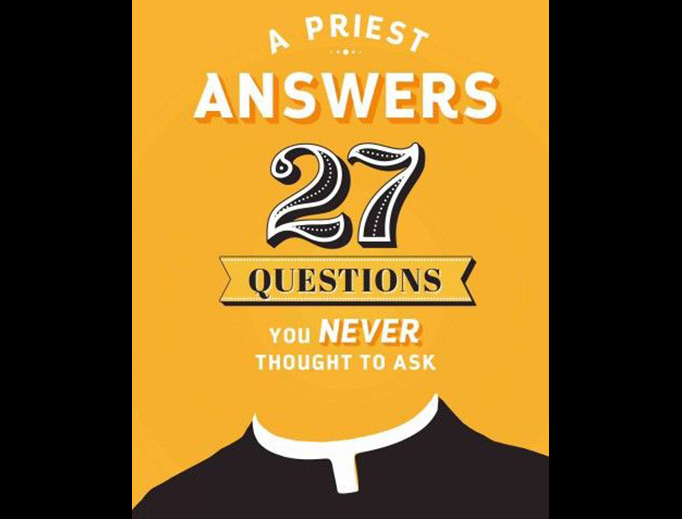A Catholic Priest's Kind and Thoughtful Answers to 27 Tricky Questions
‘A Priest Answers 27 Questions’ is a great book for Catholics, but it's also a great book for non-Catholic friends who may have questions about why we do the things we do.

If you're a faithful Catholic, you probably have a boatload of Catholic teachings that you take for granted: the Sunday Mass obligation, the seven Sacraments, the importance of both sacred Scripture and sacred Tradition. But there are other parts of Catholic life which are just as important, but which you've never really examined – other questions you may have idly dismissed, or questions you just never thought to ask. Important questions, like:
- Can a divorced person receive Communion? And how can I explain about receiving Communion to my non-Catholic relatives?
- Why must Catholics marry in a church, and not on a beach or in their favorite inn?
- Whatever happened to Limbo?
- Why can't women become priests?
- What is – and isn't – a heresy?
- What is a plenary indulgence?
Fr. Michael Kerper is a popular parish priest of the Diocese of Manchester (in New Hampshire). In his new book A Priest Answers 27 Questions You Never Thought to Ask, Father Kerper tackles these and other questions which have come up in more than 30 years of priestly ministry. His answers are clear and concise – but more than that, he writes with generosity and wit. A reader who may have nurtured a position contrary to Church teaching will not be offended by Fr. Kerper's straight-forward yet compassionate response.
Writing, for example, about the appropriate gestures for laypersons during the Mass, Father Kerper avoids the landmines which so often explode on social media whenever traditionalists and more liberal Catholics talk about whether one should shake hands or hug during the Sign of Peace, and whether it's acceptable to hold hands during the Our Father. Instead, he praises the questioner for seeking an answer, then breaks the issue into three manageable parts. He explains:
These are great questions to consider as we think about the meaning behind the words we speak and the gestures we use during Mass. Your multiple questions touch upon three interconnected issues: the importance of physical gestures in public worship; the tension between tradition and innovation; and the need to balance communal and individual preferences.”
Father Kerper explains that the kiss of peace is not some 1960s intrusion into the liturgy, but instead is an ancient custom which goes back to the early fifth century, and which is infused with symbolic meaning.
But while the sign of peace is a true traditional practice, the custom of holding hands during the Our Father is not. While the custom originated as a way of fostering community, it has two drawbacks: It draws people away from the Father, whom we address in union with Christ, by focusing too much attention on the community linked by hands. And it frequently divides the worshippers, rather than uniting them, because not all can reach the others' hands. What began as a sincere attempt to foster community has actually had the opposite effect: those who hold hands appear to be the “insiders” while a worshipper who can't or won't clasp someone's hand looks like an “outsider.”
He goes on to explain why the orans posture – the outstretched arms and hands – is the appropriate posture for the priest, as leader of the congregation, but not for the entire congregation. “Here,” he says,
...the priest acts like the conductor of an orchestra, who alone holds the baton. Imagine what would happen if other musicians rose from their seats and wielded a baton. Confusion would reign.”
In another chapter, when someone asks whether it's necessary to give alms to everyone who asks, Father Kerper's generous response is certain to avert any potential ill will. “In a wonderful way,” he begins,
...your question reveals your own basic goodness. You have listened carefully to the words of Jesus, and you acknowledge that his words lay claim to your whole life, including your dealings with people in need. You also experience the tension between the Lord's seemingly impossible demands and your own limited resources.”
There are other issues on the table in this book: questions about fasting; cremation; ghosts; confusion about the ministry of priests and deacons; whether abortion can be forgiven, and more. Father Kerper relies on Scripture, tradition, the Catechism and the writing of the saints to address each thorny issue. A Priest Answers 27 Questions is a great book for Catholics, but it's also a great book to give to a Protestant friend who may have questions about why we do the things we do. I look forward in the hope that Father Kerper is even now working on “27 MORE Questions.”













